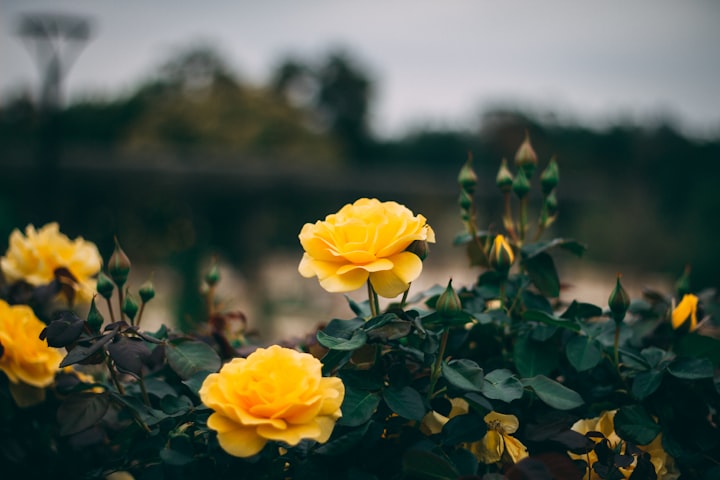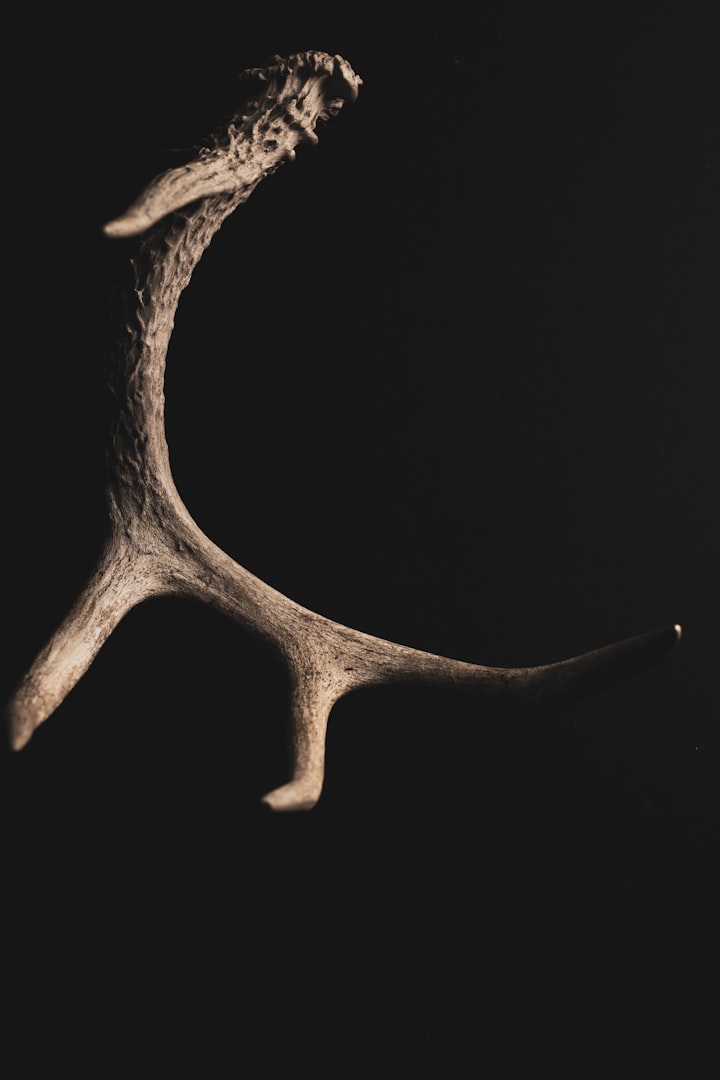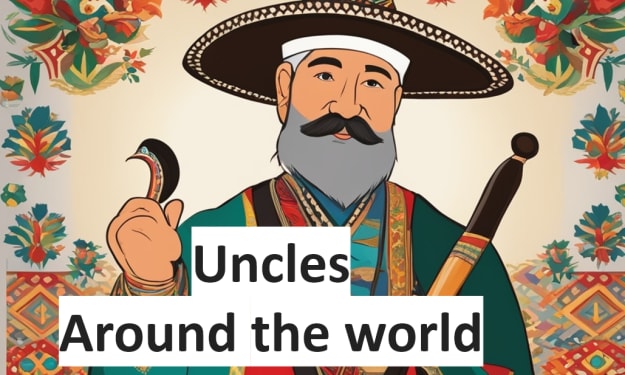
Her rough dirt-covered fingers find space between my thorns, two hands lengths below a bud that shed its last petals weeks ago in anticipation of the upcoming frost. She bends me gently with her thumb and forefinger and slices my stem at a 45-degree angle.
“There, there,’ she coos, ‘no need to bleed. No need to cry.”
She wraps my wound and stalk in a cloth soaked with water, tying my bandage secure with a bit of graying twine. Holding me tightly, she turns away from the weathered barn I have spent my short life growing beside. The roots that once fed me run under the walls and the dirt floors of the barn, creeping up and trying to grow where cracks of sunlight reach inside. The system I come from is hearty. We don’t care about mild climates or an exact amount of rainfall to thrive. We don’t stay where we are supposed to. I come from wild roots. We thrived in dirt so dry the dust never settles. We creep along the ground, scrounging out what small respite this land offers. We take over trenches and fences, adorning any place that will harbor us with tiny yellow blossoms. In winter, we hide from the cold snow, camouflaging ourselves so animals passing by mistake us for dead. In spring, we miraculously come back to life, our small green leaves unfurling, and the cycle starts over.
We are hearty, just like those who tend to us. I wonder if my resilience ends here, cut from my lifeline, or if another adventure awaits. The woman carries me gently away from the old barn and past the small house with the limestone white-wash that has eroded over the years until we reach a rickety cart pulled by a skinny grey horse. A young man in front drives the cart, yet I don’t recognize him, and a slightly older man reaches down from the back of the cart and helps the woman, still clutching me, into the back of the cart.
“A rose? Really? That’s what all the hold up is for?” The man asks in disbelief, his guttural peasant German adding a gruffness to his question, as he sits down on one of the two trunks in the back of the cart.
“It’s home, and it will bring home to us wherever we end up.” she tells him. Her voice isn’t nearly as gruff as his, but the point is made, and they sit in silence as the cart bumps along the worn wheel ridges through the sparse farmland.
Soon we reach a river, and the trunks are loaded onto a small ship. The woman clutches my stem and makes her way onto the boat with her husband. The sleeping quarters are cramped and dark, filled with other farmers and families from Hesse. Whispers of religious freedom, free farmland, and military exemptions fill the air during the days we make our way down the river. The woman saves a bit of drinking water, wets my cloth when she can, and lets the sunshine from the portholes warm me.
I grow accustomed to my new routine, but the boat docks, and we are loaded off. There are rickety carts, thin horses, sparse bags of seeds, and small plows waiting for us. Each family takes a cart and follows a makeshift trail up the river. Our settlement is little more than dry hills, but the families don’t mind--dry farming is in their blood. They get to work digging holes in the hillside, carving out living spaces to harbor them through the winter. The man finishes ours and works on a hole next to the living quarters with enough space to house the plow and seeds. The woman digs a small hole with her bare hands next to the entrance of our makeshift barn, pours water from the Volga River to make the earth soft, and plants my stem. It’s not the earth I am used to, but it’s better than the damp cloth that has kept me alive. As the weather turns chilly, the man plows ridges into the unforgiving soil and hauls water up from the river. Half the seeds are planted, and everyone waits. I don’t know how those seeds will grow in this land, but I only have the energy to focus on my roots. The woman’s neighbors cluck their tongues at her when she takes water from the wheat crops and gives me a drink. They whisper that these farms are no place for a flower, and the winter will kill me for sure. But we know different. I’ve grown in sparser areas, and winter will make me hearty.
Spring comes, then summer, and the wheat fails to thrive. The viable seeds are salvaged, and the rest is saved to nourish the family and the horses. But my roots have taken, and new shoots have started to poke up around me. The man kisses the woman on the cheek. “The rose is growing. The wheat will grow too. Patience.”
As the seasons change, more families move, enticed by the offers from the Czarina. Our sod house and barn transform into simple buildings. The wheat begins to flourish. Babies are born, grow up, and move to daughter colonies that dot the river. The woman slices my stems, which have grown up around the hill, and plants them next to our new barn and the church the community has collectively raised. She gives cuttings to her sons as they move to small houses and their daughters when they marry neighboring farmers. My generations spread as the woman’s generations grow, both of our families colonizing the land.
It’s been many years since we came to this land. The woman who brought me is long gone, buried on the hill that served as the first barn, and yellow roses cover her bones. Her great-grandson stands in his house, a few miles downstream from the original farm, dressed in the Czar’s cavalry uniform. One by one, the privileges afforded to the generations before him have been stripped away. Not much remains except the land and the religious freedom, and even that is in danger of being lost.
A woman pins one of my blossoms to the chest of his uniform and smoothes his lapel. She works the farm with her neighbors and younger brother-in-law, tending the wheat and roses when he is away. Her two oldest brothers-in-law and their families have gone. Like the generations before them, they heard of new lands that offer the freedom their families once found on the Volga. She is skeptical about leaving, which she tells me she is sure they will once her husband’s released from duty. But it isn’t her place to decide these things, she whispers to me as she prunes my stalks. They are young, and who knows where their lives may lead.
The man is home when allowed, tending wheat and his new marriage. By the time he has served his term, he is 25, they have a baby boy, and he insists it is time to leave. His brother writes “join us in this land of milk and honey, and we will settle this land for our own the same way our great-grandfather settled his.” A small amount of cash and sponsorship papers to help with the journey fall out of the envelope.
I am wrapped in a wet piece of cloth, the wound on my stalk fresh, traveling again. The woman holds me gingerly as we travel, barely leaving me alone. I lose track of how many times the sun rises and sets as we rock with the waves in this big ship. When there’s not enough water to moisten my cloth, the woman spits on my open gash and prays over me to keep me alive. I spend my days listening to babies cry, men discussing the fertile lands they are heading towards, and women swapping cures for colic, recipes for preserving cabbage, and singing hymns.
The ship pulls into port, and the families walk down a plank to crowded streets. We don’t stay long, though, and soon we board trains headed west. “Not long now.” The woman whispers to me and asks me to hold on for just a bit longer. I grow accustomed to the clickity-clack of our transport and am thankful for the daily sun and fresh water. Some of my strength returns, and I feel the brittleness in my leaves start to soften. Many families leave the train, and other families join as we follow the path of the setting sun.
Finally, it is our turn to disembark the train. The land is rugged and vast. Rolling hills and carved gorges with fast rivers dot the dry land. The man, woman, and the 1-year-old boy are met by the man’s brothers and their families. The families climb into farm wagons, and strong horses run through the sagebrush as we make our way to our new home. It is a small one-room farmhouse in the foothills of central Washington, surrounded by other small farmhouses. In the middle are the main barn and two grain silos made of 2’x4’s laid horizontally. The woman plants me next to the barn because that is where we are always planted. As the family and the town grow, I do my best to keep up.
At first, the family brings buckets of water up from the rivers, pails at a time, to water the wheat they have planted in this new land that mimics from where they came. When the wheat refuses to thrive, which isn’t often, the man and his sons travel for weeks to tend the orchards they planted down the river. The sons and daughters grow up, bury their parents, and keep tending their farms. My roots grow deeper, and my vines grow up around the boards of the barn. I reach out into the wheat, drinking from the ditches that hold rainwater. Like the family that brought me here, I acclimate and thrive. I watch dams be built, which bring water to the farms, which brings more families. I watch the sons’ and daughters’ children learn how to swim in ditches and tend the land. I watch them grow, watch them move away, and watch them come back to bury their parents.
I watch the grain silos fall, and I watch the land be parcelled off and sold. The remaining land is sublet to large farms with rotating faces, who never notice miniature yellow roses. Sometimes women arrive, with a trace in their faces I recognize, take a small cutting from my limbs, planting my cuttings in land west of the mountains. The barn I grew up next to is long gone; its dilapidated frame finally burnt down in a firefighting exercise. The land has changed too--much of the wheat has been replaced with genetically modified short apple trees and vineyards. And the love and care that transported me here and the generations before me to other rivers are long gone. But look closely, and you’ll see me, growing deeply rooted where no one expects. I am still here.

*Although this story is fiction, it is based on family folklore than my third-great grandmother brought a yellow german rose with her when her family emigrated to Russia from Germany in 1763 under Czarina Catherine the Great. The story continues that cuttings were brought to America when my great-grandfather’s family fled persecution as the 3rd and 4th generation Volga Germans began to be relocated. The cuttings were planted in the towns of central Washington state where the family settled. As the family established themselves as one of the region’s successful dry-farming families, the roses also spread across the state’s middle. They can still be found on many of the family’s original farmsteads, in farmland ditches, and even growing widely along the side of the main county roads and freeways.
About the Creator
Colleen Borst
As an artist and a writer, I love pulling strands of folklore into our current world, imagining what could be, and paying respect to the past.
Visit me at ColleenBorst.com or etsy.com/shop/ModernHexology
Enjoyed the story? Support the Creator.
Subscribe for free to receive all their stories in your feed. You could also pledge your support or give them a one-off tip, letting them know you appreciate their work.






Comments
There are no comments for this story
Be the first to respond and start the conversation.